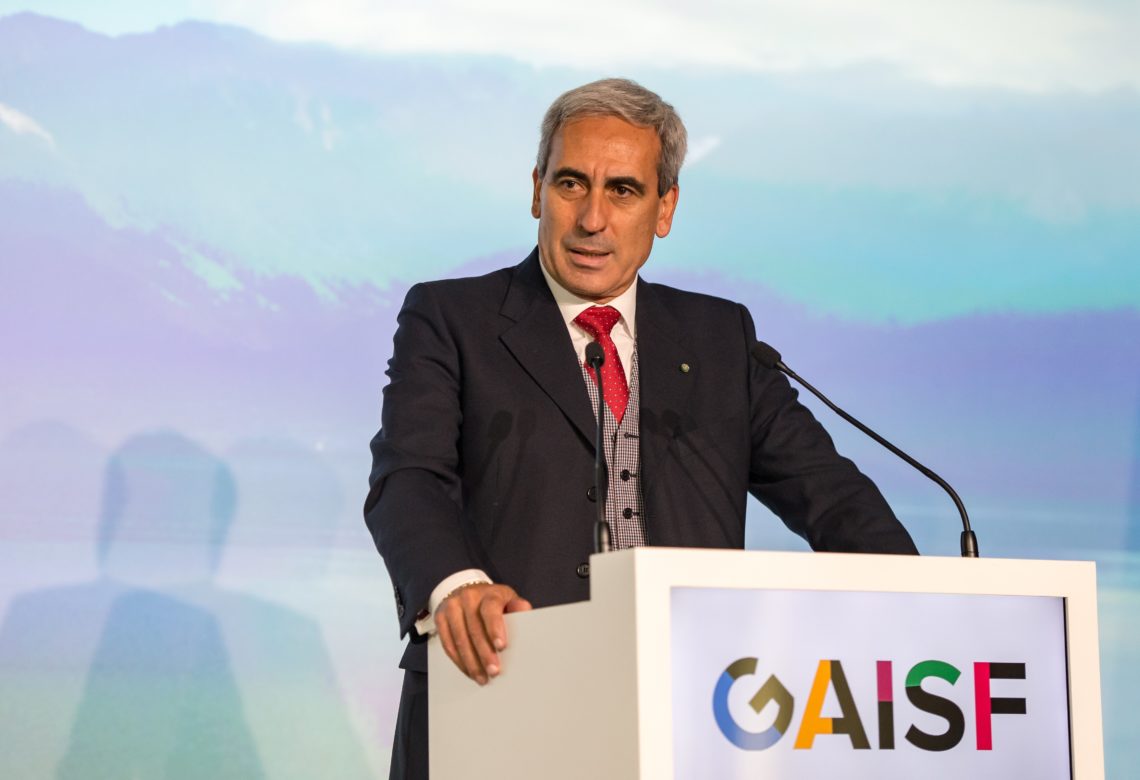
“Sustainability is at the heart of sport and will be more important than ever in a post-Covid-19 environment,” says GAISF President Raffaele Chiulli. “Post-pandemic, sport will have to take more responsibility for society and take action to help us secure our present and our future.”
Chiulli joins this interview a few hours after arriving home from Budapest, where he was a guest for the World Judo Championships. It’s the latest major event to occur as global sport gets its calendar back on track, and a sure sign that the Olympic Movement is headingin the right direction after an uncertain 15 months.
But the landscape has changed significantly, and Chiulli believes that sport’s big comeback includes this wider social and environmental perspective.
He expresses pride that GAISF’s sustainability.sport platform has had a successful first year. Since launching in June 2020, the portal has curated 900 case studies, reports and initiatives to give its members and other stakeholders in the sporting ecosystem a ‘one-stop-shop’ for all the important sustainability documents produced for or related to sport.
It has also developed partnerships with the IUCN, The Sustainability Report, sportanddev and SandSI, and Chiulli is sure that the platform is “playing a key role” in helping sports organisations implement sustainability policies and projects.
However, rather than being passive members of the sustainability movement, Chiulli – who has a professional background in energy management – believes that sport can lead the way with technology and innovation to move other parts of society forward.
The pandemic has already forced many organisations to move to remote working and online meetings, and the President explains that “a number of GAISF members” will start to incorporate remote meetings as a matter of course, rather than flying around the world to gather.
More broadly, Chiulli sees sport’s relationship with transport, particularly around big events, as the area in which a lot of progress can be made.
“The mobility of goods and people is, without doubt, one of the toughest environmental challenges of our time,” he says. “Two-thirds of global CO2 emissions are related to transport and energy, and it’s anticipated that passenger traffic and freight volume will continue to grow.
“This is directly related to sport, not only because of the significant number of spectators, athletes and officials who travel to sports events in normal times, but because of the goods that need to be transported to events. Finding sustainable mobility solutions to significantly decrease these environmental impacts will be crucial.”
Chiulli highlights sports federations intrinsically linked to motorsport – the FIA (International Automobile Federation), FIM (International Motorcycle Federation), FAI (World Air Sport Federation), and UIM (International Powerboat Federation) for whom he is also President – as organisations with the ability and means to push things forward and develop innovation that could have a wider societal impact.
World Sailing, he says, is also “doing an incredible job in this regard” through its electric boat initiative (the federation wants to eliminate fossil fuel-powered boats from its competitions by 2025) and sustainability education programme, while the UCI’s (International Cycling Union) promotion of cycling as everyday mobility as well as sport is “making a positive impact”.
Last year, the UIM (he is also the UIM President) , announced that it was working in partnership with Formula E and Extreme E founder Alejandro Agag and Formula 1 engineer Rodi Basso to establish an electric powerboat series, UIM E1 Series.
UIM E1 Seriesis due to start next year and could have the same impact on decarbonising the marine industry as Formula E has on accelerating electric car adoption, Chiulli enthuses. His vision is to see the UIM E1 Series “act as a test-bed for marine electric technology” that will be “critical to preserving our oceans, seas and lakes for future generations”.
“We all want to reach very ambitious goals in terms of pushing sustainable mobility forward. Rodi, Alejandro and myself created a very positive chemistry among ourselves and it’s quite natural for us to talk about these innovative solutions” he explains.
Although sustainability will be a core element of the competition, it is being positioned as a high-octane, entertaining spectacle in its own right. The boats will travel across the water up to 93km per hour and the RaceBird boat that has been designed for the competition looks every bit the high-tech racing machine.
“I’m sure that we’ll not only attract motorsport fans, but we’ll engage a significantly wider audience that cares about sustainability,” says Chiulli. “UIM E1 Seriesis certainly the world-first electric powerboat series, environmentally-friendly and it will be a fascinating, entertaining competition. Several motorsport legends have already expressed a wish to be ambassadors of this initiative, and it will be a fantastic lab for innovative solutions and new technologies that can be incorporated by society in general”
He adds: “I think sustainability is a non-negotiable aspect for sport. We must lead from the forefront, not just by innovating but by leading through example with what we’re trying to do. This has to start with sport’s infrastructure.”
Interview by Matthew Campelli
Latest News



Athletes, International Federations and National Olympic Committees honoured as IOC announces winners of Climate Action Awards
Read more

